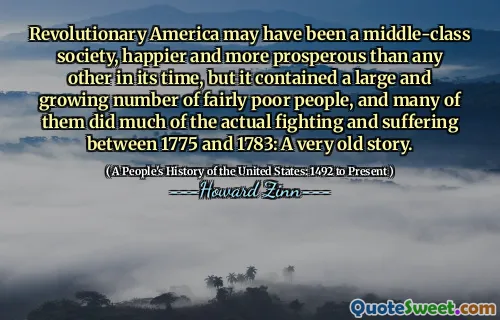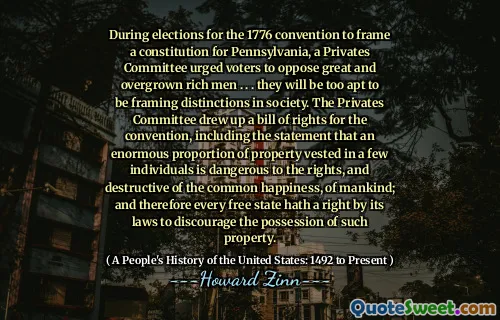
During elections for the 1776 convention to frame a constitution for Pennsylvania, a Privates Committee urged voters to oppose great and overgrown rich men . . . they will be too apt to be framing distinctions in society. The Privates Committee drew up a bill of rights for the convention, including the statement that an enormous proportion of property vested in a few individuals is dangerous to the rights, and destructive of the common happiness, of mankind; and therefore every free state hath a right by its laws to discourage the possession of such property.
This quote eloquently highlights a profound concern that remains relevant centuries later: the dangers of concentrated wealth and its impact on equality and societal well-being. At the time of the 1776 Pennsylvania convention, the framers already recognized that allowing excessive property and power to reside in the hands of a few could imperil not only economic balance but also the fundamental rights and happiness of the larger populace. The concept that a "free state" holds the authority to curtail such dangerous accumulation is a powerful assertion of democratic values aimed at preventing plutocracy. It resonates strongly with Howard Zinn's perspective that history is often a narrative shaped by struggles against entrenched power and inequality. This early American warning against "overgrown rich men" mirrors many modern debates over wealth inequality, economic justice, and political influence. The notion that laws should be employed actively to discourage disproportionate possession of property challenges the common glorification of unregulated capitalism and the myth of meritocracy. It prompts us to reflect on how socioeconomic disparities can lead to social distinctions that harm collective freedom and happiness. The quote underscores the timelessness of such struggles; it reminds us that democratic frameworks must continually re-examine power distributions to safeguard equality and common welfare. In a broader sense, it invites consideration of how contemporary policies might align or diverge from these foundational warnings, and the ongoing tension between private wealth accumulation and public good. Fundamentally, this remarkable statement from the 18th century calls for vigilance against economic domination of society and serves as a compelling rallying cry for a more just and equitable polity.








